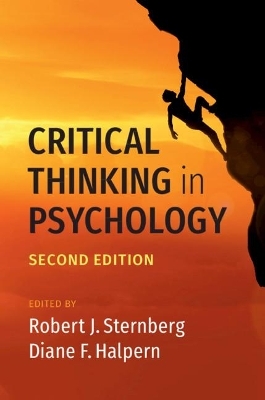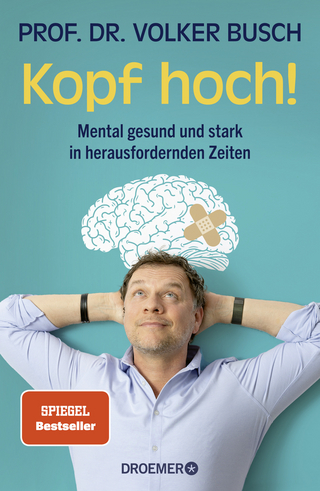
Critical Thinking in Psychology
Cambridge University Press (Verlag)
978-1-108-49715-2 (ISBN)
Good scientific research depends on critical thinking at least as much as factual knowledge; psychology is no exception to this rule. And yet, despite the importance of critical thinking, psychology students are rarely taught how to think critically about the theories, methods, and concepts they must use. This book shows students and researchers how to think critically about key topics such as experimental research, statistical inference, case studies, logical fallacies, and ethical judgments. Using updated research findings and new insights, this volume provides a comprehensive overview of what critical thinking is and how to teach it in psychology. Written by leading experts in critical thinking in psychology, each chapter contains useful pedagogical features, such as critical-thinking questions, brief summaries, and definitions of key terms. It also supplies descriptions of each chapter author's critical-thinking experience, which evidences how critical thinking has made a difference to facilitating career development.
Robert J. Sternberg is Professor of Human Development at Cornell University, New York, and Honorary Professor of Psychology at Heidelberg University, Germany. Diane F. Halpern is Professor Emeritus of Psychology at Claremont McKenna College, California.
1. An introduction to critical thinking: maybe it will change your life Diane F. Halpern and Robert J. Sternberg; 2. Nobelists gone wild: case studies in the domain specificity of critical thinking Scott O. Lilienfeld, Candice Basterfield, Shauna M. Bowes and Thomas H. Costello; 3. Why science succeeds, and sometimes doesn't Jonathan Baron; 4. Critical thinking and the rejection of unsubstantiated claims D. Alan Bensley; 5. Promoting critical thinking by teaching, or taking, psychology courses Douglas A. Bernstein; 6. Avoiding and overcoming misinformation on the Internet Jason L. G. Braasch and Arthur C. Graesser; 7. Critical thinking impacts our everyday lives Heather A. Butler and Diane F. Halpern; 8. Research suffers when we all agree: how sociopolitical homogeneity impairs critical thinking in the academy Stephen J. Ceci and Wendy M. Williams; 9. When all is just a click away: is critical thinking obsolete in the digital age? Gerd Gigerenzer; 10. Critical thinking: promise, progress, and paradox Jane S. Halonen and Dana S. Dunn; 11. Evaluating experimental research Henry L. Roediger, III and Jeremy K. Yamashiro; 12. Critical thinking as scientific reasoning: examining the power of sports momentum John Ruscio and Kevin Brady; 13. Critical thinking in STEM disciplines Robert J. Sternberg; 14. Why would anyone do or believe such a thing? A social influence analysis Anthony R. Pratkanis; 15. Conclusion: how to think critically about politics (and anything else!) Robert J. Sternberg and Diane F. Halpern.
| Erscheinungsdatum | 16.01.2020 |
|---|---|
| Zusatzinfo | Worked examples or Exercises; 12 Tables, black and white; 9 Line drawings, black and white |
| Verlagsort | Cambridge |
| Sprache | englisch |
| Maße | 158 x 235 mm |
| Gewicht | 680 g |
| Themenwelt | Sachbuch/Ratgeber ► Gesundheit / Leben / Psychologie ► Psychologie |
| Geisteswissenschaften ► Psychologie ► Allgemeine Psychologie | |
| Geisteswissenschaften ► Psychologie ► Pädagogische Psychologie | |
| Geisteswissenschaften ► Psychologie ► Test in der Psychologie | |
| ISBN-10 | 1-108-49715-2 / 1108497152 |
| ISBN-13 | 978-1-108-49715-2 / 9781108497152 |
| Zustand | Neuware |
| Haben Sie eine Frage zum Produkt? |
aus dem Bereich


